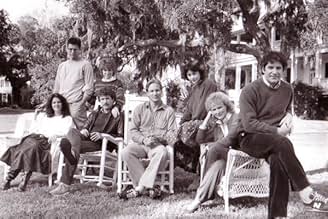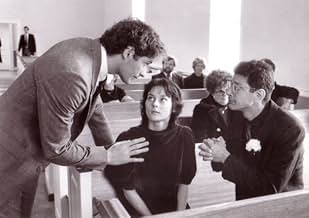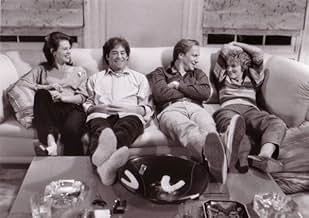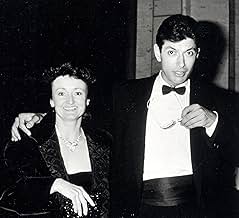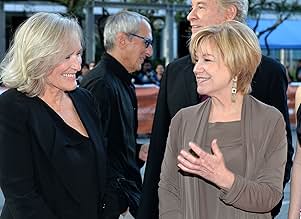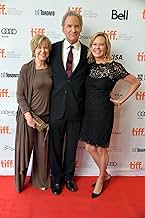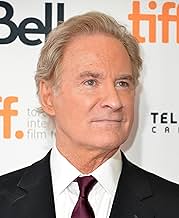Un groupe de sept anciens amis de l'université se retrouve lors d'une réunion en week-end dans une maison de vacances en Caroline du Sud après les funérailles d'un autre de leurs amis de l'u... Tout lireUn groupe de sept anciens amis de l'université se retrouve lors d'une réunion en week-end dans une maison de vacances en Caroline du Sud après les funérailles d'un autre de leurs amis de l'université.Un groupe de sept anciens amis de l'université se retrouve lors d'une réunion en week-end dans une maison de vacances en Caroline du Sud après les funérailles d'un autre de leurs amis de l'université.
- Réalisation
- Scénario
- Casting principal
- Nommé pour 3 Oscars
- 3 victoires et 8 nominations au total
Jonathan Kasdan
- Harold and Sarah's Son
- (as Jon Kasdan)
Jake Kasdan
- Autograph Seeker
- (as Jacob Kasdan)
Avis à la une
"The Big Chill" is often regarded as the best Hollywood movie to demonstrate ensemble acting. A problem that can affect similar films is the unequal division of time that each character receives, but "The Big Chill" avoids this problem. It certainly is a moving cinematic experience that isn't easily forgotten. OK it doesn't really lead anywhere, but as it goes on, the nostalgic charm sets in and the core isn't hollow.
Terrific performances from the ensemble cast who work well as a group. It's ironic how Kevin Costner had the most successful career yet if you blink you'll miss him. Some of the careers of the talented cast bloomed after this- Kevin Kline won an Oscar for "A Fish Called Wanda", Glenn Close got 5 nominations (this film included) and got a status in Hollywood, Jeff Goldblum got success in the likes of "Jurassic Park" and "Independence Day". Others didn't- Meg Tilly sort of disappeared, JoBeth Williams went on to flops such as Stop Or My Mom Will Shoot, Mary Kay Place had small parts in Girl Interupted and Being John Malkovich but went by un-noticed.
"The Big Chill" is a complex and often brilliant story of the need for companionship. The soundtrack greatly adds to the nostalgic and uplifting feel to the movie. Great performances, splendid direction and an engaging script make this a deserved (if not slightly dated) classic. My IMDb rating: 8.0/10.
Terrific performances from the ensemble cast who work well as a group. It's ironic how Kevin Costner had the most successful career yet if you blink you'll miss him. Some of the careers of the talented cast bloomed after this- Kevin Kline won an Oscar for "A Fish Called Wanda", Glenn Close got 5 nominations (this film included) and got a status in Hollywood, Jeff Goldblum got success in the likes of "Jurassic Park" and "Independence Day". Others didn't- Meg Tilly sort of disappeared, JoBeth Williams went on to flops such as Stop Or My Mom Will Shoot, Mary Kay Place had small parts in Girl Interupted and Being John Malkovich but went by un-noticed.
"The Big Chill" is a complex and often brilliant story of the need for companionship. The soundtrack greatly adds to the nostalgic and uplifting feel to the movie. Great performances, splendid direction and an engaging script make this a deserved (if not slightly dated) classic. My IMDb rating: 8.0/10.
1983's THE BIG CHILL is one of those beautifully crafted and wonderfully acted films that is so ingratiating that I can watch it over and over and never tire of it. Director Lawrence Kasdan hits the bullseye in this alternately hilarious and moving variation on the earlier RETURN OF THE SECAUCUS SEVEN. This film follows the reunion of a group of friends who went to college together, who have gathered for the funeral of their mutual friend, Alex, who has committed suicide. The original screenplay included scenes with Alex, who was played by Kevin Costner, but, in a stroke of genius, it was decide to delete all of the Alex scenes in the film, lending a wonderful air of mystery to the character of Alex and allowing the audience more input as to why Alex decided to end his life. Alex's friends are Harold Cooper (Kevin Kline), who now owns a shoe store franchise and his doctor-wife, Sarah (Glenn Close), who also serve as our hosts ; Michael (Jeff Goldblum), a writer for PEOPLE magazine; Meg (Mary Kay Place)an attorney who wants to have a baby; Sam (Tom Berenger) an actor with his own TV show who misses the simple life; Karen (JoBeth Williams), a restless housewife who would really like to be a writer and Nick (William Hurt) a drug dealer who would like to be anything else. Also thrown into the mix is Chloe (Meg Tilly) Alex's girlfriend, who knows a completely different Alex than his friends do. This gathering of old and new friends sets the stage for some long-dormant resentments to bubble to the surface and for some long buried passions to be re-ignited. Kasdan has a sharp directorial eye and a flawless ear for dialogue with one of the most quotable screenplays ever and it is all set to a soundtrack of the greatest music from the 1960's ever compiled for a movie soundtrack. The cast is perfection...Close received a Best Supporting Actress nomination but the entire cast works at the same level and to honor one without honoring the ensemble wouldn't have been right. This is the ultimate ensemble piece and it works just about perfectly. Anyway you slice it, an instant classic.
As a member of Gen-X having just revisited this movie after several years, I have to say that the soundtrack took me down "memory lane" in a big way, and may be one of the best things about The Big Chill. My generation's experience with this music is very different than that of my parents', having been force-fed Three Dog Night, The Band, and all the rest as a young child. It remains a part of my psyche, buried deep in the most obscure and remote of my memories. It was fantastic to hear those songs again, in spite of how much my taste in music has changed over the years. A classic is a classic, and the soundtrack is LOADED with them. Music can make or break a movie, and in The Big Chill, the music is an integral part of the film, as important as the cast, the writing and the directing. Its hard to imagine different music, just as it's hard to imagine a different cast. The songs weave in and out of the movie as easily and naturally as the subplots weave in and out of the story.
22 years after being dragged to this movie by my parents (who LOVED it), I remain pleasantly surprised at what a good movie it is as a whole, and how much more I liked it as an adult. The acting is brilliant. The writing is excellent. The directing is fantastic. Everything snaps into place in ways that keep you from getting bored, irritated, or otherwise turned off. Sometimes melodramatic, sometimes hilarious, the characters are well-constructed by the writer(s) and beautifully brought to life by the cast. Two hours fly by without dragging, down time, misfires or backfires. The story unfolds in 1983 with a crew of Baby Boomers, college friends brought back together by tragedy, taking stock in their lives as they get reacquainted with each other after many years have passed. The story may be dated, but anyone, no matter their "generation," can find something to relate to in this film. The interpersonal relationships, the individual journeys, and the self-reckoning that comes with the death of a friend... all of us can grasp these concepts and drink them in, get lost in them, feel the pain, and feel the joy. We can relate to it because its themes are timeless... love, loss, sadness, joy, growing up and getting older. This happens to us all.
My only real criticism of this picture would be that once in a while the film was a little too poignant and too depressing for my tastes, but only for brief moments. It could be that no one else who sees this film will agree with me, or even notice. That's fine. Opinions...we all have them. For me, it went a little overboard, just a smidgen. This is the only reason I did not give this movie a 10. It is still a wonderful movie. Some might suggest that this "going overboard" was what made the movie effective. It was effective, very much so, but for me it was a bit too much from time to time. Once in a while, my heart strings need a rest.
However, the music remains the most memorable part of the film. I had to look The Big Chill up on the internet to be reminded of the general story line, but the music has stayed with me all these years, and will remain with me, from the first notes of Joy to the World through the rest of the soundtrack and back. I would watch this movie again, and recommend it to anyone, no matter how cynical they are or what generation they belong to. Its that good.
22 years after being dragged to this movie by my parents (who LOVED it), I remain pleasantly surprised at what a good movie it is as a whole, and how much more I liked it as an adult. The acting is brilliant. The writing is excellent. The directing is fantastic. Everything snaps into place in ways that keep you from getting bored, irritated, or otherwise turned off. Sometimes melodramatic, sometimes hilarious, the characters are well-constructed by the writer(s) and beautifully brought to life by the cast. Two hours fly by without dragging, down time, misfires or backfires. The story unfolds in 1983 with a crew of Baby Boomers, college friends brought back together by tragedy, taking stock in their lives as they get reacquainted with each other after many years have passed. The story may be dated, but anyone, no matter their "generation," can find something to relate to in this film. The interpersonal relationships, the individual journeys, and the self-reckoning that comes with the death of a friend... all of us can grasp these concepts and drink them in, get lost in them, feel the pain, and feel the joy. We can relate to it because its themes are timeless... love, loss, sadness, joy, growing up and getting older. This happens to us all.
My only real criticism of this picture would be that once in a while the film was a little too poignant and too depressing for my tastes, but only for brief moments. It could be that no one else who sees this film will agree with me, or even notice. That's fine. Opinions...we all have them. For me, it went a little overboard, just a smidgen. This is the only reason I did not give this movie a 10. It is still a wonderful movie. Some might suggest that this "going overboard" was what made the movie effective. It was effective, very much so, but for me it was a bit too much from time to time. Once in a while, my heart strings need a rest.
However, the music remains the most memorable part of the film. I had to look The Big Chill up on the internet to be reminded of the general story line, but the music has stayed with me all these years, and will remain with me, from the first notes of Joy to the World through the rest of the soundtrack and back. I would watch this movie again, and recommend it to anyone, no matter how cynical they are or what generation they belong to. Its that good.
10kal1
After reading several of the user comments on this movie, it is clear that many people missed quite a bit. Those "funny one-liners" (and there are plenty!) are much more than that: they tell us volumes about the characters. This movie certainly does not spell anything out to the viewer (except, perhaps, the obvious), so you must be able to find the meaning behind the words. If you listen to what the characters are saying, then you can understand their past relationships, their present feelings, which friends have stayed close, etc. Remember, these are old friends: the script is very realistic so the characters are not going to explain every line to one another. I believe to truly enjoy this movie you need to pay close attention to all of the details and understand a bit about the attitudes and ideals of the two eras the movie depicts.
Wonderful, intelligent movie!
Wonderful, intelligent movie!
When I was a student at Cambridge in the early eighties, shortly before "The Big Chill" came out, a friend of mine had a poster on his wall entitled "Woodstock Tenth Anniversary Reunion". (The actual anniversary had taken place in August 1979, not long before we went up). The joke was that those attending the reunion were all middle-class professional types, smartly dressed in lounge suits with well-trimmed short hair. This poster exemplified the way in which my generation saw the baby boomers, twentysomething hippies turned thirtysomething yuppies. Those who still retained their hippie idealism were mercilessly derided as being at least ten years behind the times. (And derided not only by Cambridge students but also by the likes of B. A. Robertson, in his satirical song "Kool in the Kaftan").
"The Big Chill" takes a rather more charitable look at the problems facing those idealists from the 1960s who tried to retain their idealism during the conservative Reagan years of the early 1980s. It features a group of old college friends from the University of Michigan who are reunited after fifteen years. The event which reunites them is the death of Alex, one of the group, who committed suicide while staying at the home of his friends Harold and Sarah. An impromptu reunion occurs as the old friends gather for Alex's funeral.
The precise reasons why Alex killed himself are not spelled out- he did not leave a suicide note- but as the movie progresses we realise that he had become disillusioned with the course his life had taken. (He was a brilliant scientist, but had dropped out of the academic life to become a social worker). His friends also come to realise this, and the realisation prompts them to consider the paths their own lives have taken. Most of the group were involved in the counterculture of the 1960s and the peace movement or other forms of radical politics, but most are now living much more conservative, middle-class lifestyles. Harold is a business executive and his wife Sarah a doctor; they live in an elegant antebellum home in the South. Sam, a one-time radical, has now become a Hollywood actor closely based upon Tom Selleck, down to the moustache. (While watching the film I assumed that Selleck himself was playing the part; it was only when I saw the cast-list that I realised it was actually Tom Berenger). Karen is also now living an affluent lifestyle but is feeling dissatisfied with her husband Richard (who was not one of the college group). Michael, once a radical journalist, now works for the apolitical, celebrity-obsessed "People Magazine". Nick, a Vietnam War veteran, has now become a drug dealer. Apart from their friend's suicide, the question which haunts the group is what became of their youthful idealism?
Contrary to what one might have expected, the film does not take a straightforward "radicalism good, conservatism bad" line. A key scene comes when Nick nearly gets himself arrested by badmouthing the local policeman. Harold, a personal friend of the officer, manages to smooth things out, but then berates Nick for his rudeness and stupidity. To Nick, who still subscribes to the sixties idea that all cops are "pigs" , this may seem like a sellout to the enemy, but I suspect that most of the audience will side with Harold who realises that some of his contemporaries have difficulty in distinguishing between idealism and childishness.
"The Big Chill" has something in common with another movie from the early eighties, Barry Levinson's "Diner" from 1981, which also deals with a reunion of a group of former classmates, although that film is a period piece set in 1959 and the characters are rather younger, being in their twenties rather than their thirties. What the two films have in common is that both are excellent examples of ensemble acting.
This was the second film of its director Lawrence Kasdan (his first was the very different neo-noir thriller "Body Heat") and it starred a number of actors, such as William Hurt and Kevin Kline, who were to become regulars in Kasdan's movies. , (Kevin Costner, originally cast as Alex, was edited out of the final version, but also went on to become a Kasdan regular). There are too may good performances to list them all, but special mentions must go to Kline as Harold, Glenn Close as Sarah and Meg Tilly as Alex's strange, unworldly younger girlfriend Chloe.
One question much discussed on this board is whether the film is "dated". Leaving aside trivial questions of fashion (even in the eighties Tom Berenger's hairstyle must have looked very seventies), I think that it is "dated", but only in the narrow, limited sense that it deals with cultural phenomena such as the sixties counterculture which were very much of their own era. In a wider sense it is not dated because it deals with timeless issues such as love, friendship and the challenge of staying true to one's youthful ideals in later life. (Another eighties film on this theme, although in my view a less successful one, is Fred Schepisi's "Plenty").
I felt that the film was occasionally slow-moving, with too great an emphasis on talk over action. I also wondered whether it might not have been improved by keeping Costner's scenes to allow us to see what sort of a person Alex was and why his death had such a traumatic impact on his friends. Overall, however, I felt that it was a very watchable film, and often a moving one- one that could be watched for pleasure not only by those who are too young to remember the sixties but even those who are too young to remember the eighties. 7/10
"The Big Chill" takes a rather more charitable look at the problems facing those idealists from the 1960s who tried to retain their idealism during the conservative Reagan years of the early 1980s. It features a group of old college friends from the University of Michigan who are reunited after fifteen years. The event which reunites them is the death of Alex, one of the group, who committed suicide while staying at the home of his friends Harold and Sarah. An impromptu reunion occurs as the old friends gather for Alex's funeral.
The precise reasons why Alex killed himself are not spelled out- he did not leave a suicide note- but as the movie progresses we realise that he had become disillusioned with the course his life had taken. (He was a brilliant scientist, but had dropped out of the academic life to become a social worker). His friends also come to realise this, and the realisation prompts them to consider the paths their own lives have taken. Most of the group were involved in the counterculture of the 1960s and the peace movement or other forms of radical politics, but most are now living much more conservative, middle-class lifestyles. Harold is a business executive and his wife Sarah a doctor; they live in an elegant antebellum home in the South. Sam, a one-time radical, has now become a Hollywood actor closely based upon Tom Selleck, down to the moustache. (While watching the film I assumed that Selleck himself was playing the part; it was only when I saw the cast-list that I realised it was actually Tom Berenger). Karen is also now living an affluent lifestyle but is feeling dissatisfied with her husband Richard (who was not one of the college group). Michael, once a radical journalist, now works for the apolitical, celebrity-obsessed "People Magazine". Nick, a Vietnam War veteran, has now become a drug dealer. Apart from their friend's suicide, the question which haunts the group is what became of their youthful idealism?
Contrary to what one might have expected, the film does not take a straightforward "radicalism good, conservatism bad" line. A key scene comes when Nick nearly gets himself arrested by badmouthing the local policeman. Harold, a personal friend of the officer, manages to smooth things out, but then berates Nick for his rudeness and stupidity. To Nick, who still subscribes to the sixties idea that all cops are "pigs" , this may seem like a sellout to the enemy, but I suspect that most of the audience will side with Harold who realises that some of his contemporaries have difficulty in distinguishing between idealism and childishness.
"The Big Chill" has something in common with another movie from the early eighties, Barry Levinson's "Diner" from 1981, which also deals with a reunion of a group of former classmates, although that film is a period piece set in 1959 and the characters are rather younger, being in their twenties rather than their thirties. What the two films have in common is that both are excellent examples of ensemble acting.
This was the second film of its director Lawrence Kasdan (his first was the very different neo-noir thriller "Body Heat") and it starred a number of actors, such as William Hurt and Kevin Kline, who were to become regulars in Kasdan's movies. , (Kevin Costner, originally cast as Alex, was edited out of the final version, but also went on to become a Kasdan regular). There are too may good performances to list them all, but special mentions must go to Kline as Harold, Glenn Close as Sarah and Meg Tilly as Alex's strange, unworldly younger girlfriend Chloe.
One question much discussed on this board is whether the film is "dated". Leaving aside trivial questions of fashion (even in the eighties Tom Berenger's hairstyle must have looked very seventies), I think that it is "dated", but only in the narrow, limited sense that it deals with cultural phenomena such as the sixties counterculture which were very much of their own era. In a wider sense it is not dated because it deals with timeless issues such as love, friendship and the challenge of staying true to one's youthful ideals in later life. (Another eighties film on this theme, although in my view a less successful one, is Fred Schepisi's "Plenty").
I felt that the film was occasionally slow-moving, with too great an emphasis on talk over action. I also wondered whether it might not have been improved by keeping Costner's scenes to allow us to see what sort of a person Alex was and why his death had such a traumatic impact on his friends. Overall, however, I felt that it was a very watchable film, and often a moving one- one that could be watched for pleasure not only by those who are too young to remember the sixties but even those who are too young to remember the eighties. 7/10
Le saviez-vous
- AnecdotesKevin Kline met future wife Phoebe Cates when she auditioned for the part of Chloe.
- GaffesHarold tells Nick that a big company is going to buy his company, so Nick should trade on that info so he can clean up his life. Harold also gives that info to Alex, and Alex was able to leverage that info to make the money that he used to buy the house. Alex couldn't have profited from that info, because it hadn't happened, yet.
- Versions alternativesCBS edited 6 minutes from this film for its 1986 network television premiere.
- ConnexionsEdited into The Pitchfork Retreat
- Bandes originalesI Heard It Through the Grapevine
Written by Norman Whitfield and Barrett Strong
Performed by Marvin Gaye
Courtesy of Motown Records and Jobete Music
Meilleurs choix
Connectez-vous pour évaluer et suivre la liste de favoris afin de recevoir des recommandations personnalisées
- How long is The Big Chill?Alimenté par Alexa
Détails
- Date de sortie
- Pays d’origine
- Langue
- Aussi connu sous le nom de
- Reencuentro
- Lieux de tournage
- Sociétés de production
- Voir plus de crédits d'entreprise sur IMDbPro
Box-office
- Budget
- 8 000 000 $US (estimé)
- Montant brut aux États-Unis et au Canada
- 56 399 659 $US
- Week-end de sortie aux États-Unis et au Canada
- 3 662 152 $US
- 2 oct. 1983
- Montant brut mondial
- 56 399 792 $US
Contribuer à cette page
Suggérer une modification ou ajouter du contenu manquant

Lacune principale
By what name was Les Copains d'abord (1983) officially released in India in Hindi?
Répondre



